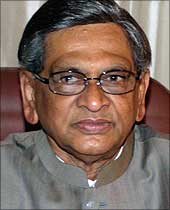 More than 100 diplomats gathered on Monday to listen to lectures by Prime Minister Manmohan Singh and various experts from the fields of culture, trade and information-technology.
More than 100 diplomats gathered on Monday to listen to lectures by Prime Minister Manmohan Singh and various experts from the fields of culture, trade and information-technology.
The second conference of the heads of Indian missions abroad began on Monday morning at Vigyan Bhawan in New Delhi. The four-day conference will comprise three days of active sessions with many thematic discussions and debates. Dr Singh will address the diplomats on Tuesday morning.
The conference was formally inaugurated by External Affairs Minister S M Krishna. In his address, Krishna said, "Development, inclusive economic growth and alleviation of poverty have to be our foremost strategic goals."
He told diplomats that they should contribute in creating an 'external environment' which ensures security and promotes trade so that India can fulfill those goals.
"We should never forget that the aspirations of India's people are the bedrock of India's foreign policy," he said.
Talking about India's 'immediate neighbourhood', Krishna said, "India is committed to close and good neighbourly relations with all the countries in the Indian subcontinent."
He added, "Bhutan is the first country I visited on assuming charge as the foreign minister and for good reason. India has strongly supported Bhutan's transition to a democratic polity."
He said, "The conclusion of the military operations culminating in the defeat of the Liberation Tigers of Tamil Eelam in Sri Lanka provides it an opportunity for a future free from terrorism and conflict. We have been providing humanitarian assistance to Sri Lanka and hope that the internally displaced persons will be rehabilitated soon".
Talking about Afghanistan, he said, "Last week, we had presidential elections in Afghanistan, against the backdrop of an attempt by the Taliban to raise levels of violence. We have stood firmly behind the Afghanistan government's efforts to stabilise the country. This is natural given our age-old ties, our responsibility to a friendly country in our region and given our national security interest in a stable, independent and peaceful Afghanistan, which will remain a priority".
While expressing his view on Pakistan, the foreign minister said, "We have maintained that a stable Pakistan (which is) at peace with itself and the region is a desirable goal. We wish to address our differences with Pakistan through dialogue."
But Krishna agreed that Pakistan has not taken effective steps yet against the perpetrators of the terror attack on Mumbai.
He said that India has, "made it clear that a meaningful dialogue will only be possible following the fulfillment by Pakistan of its commitment not to allow its territory to be used for terrorist activities against India. Pakistan must honour the pledges made in this regard. Following the Mumbai attacks of November 26, 2008, Pakistan has taken some steps under the pressure of the evidence presented to them. However, we are still to see Pakistan take effective steps to end infiltration and dismantle the infrastructure of terrorism."
While talking about China, Krishna said, "There is space for both of us to grow and meet our aspirations. China is now India's largest trading partner and there is congruence in our views on many global issues, but there are outstanding bilateral issues that should be resolved peacefully through dialogue."
While he asserted that India's relations with Russia are time tested and ties are growing in the fields of nuclear energy, space and defence with the United States as well, 'new dialogue architecture' would reflect the increasingly global character of bilateral dialogue.
He said India's stand on World Trade Organisation's Doha round of negotiations will "protect the livelihoods of the poor and the marginalised, particularly in our rural sectors."
He stressed that the 'economic work of our missions abroad is increasing in importance as India's engagement with the world has deepened and our global trade has grown substantially in recent years".
He also said that India's 'soft power' is a tremendous asset to promote India's visibility and influence in the global arena today.
While welcoming the 112 heads of missions who have gathered in New Delhi for the conference, Foreign Secretary Nirupama Rao, in her opening remarks, spoke of the role, agenda and challenges confronting Indian diplomats, particularly the heads of missions, today.
She said that the Indian diplomat today needed to introspect on how his or her practice of the art of diplomacy and the tools used for it, must adapt or change in response to the challenges in the world and the decentralisation of the international landscape.
Rao said that the context in which our diplomats worked today was defined not only by the external dimensions of India's foreign policy, but also by the country's domestic needs and aspirations. She stressed the need for future oriented strategies to address, issues such as personnel strength and interaction with academic and research institutions, as part of a 'retooling' process.
During the interactive session that followed, the HOMs made a number of suggestions for strengthening communication and exchanges between the various missions and the external affairs ministry.
Besides Krishna and Nirupama Rao, Union Agriculture Minister Sharad Pawar, National Security Advisor M K Narayanan, Institute for Defence Studies and Analyses chief N Sisodia, India's culture guru Kapila Vatsyanan and National Association of Software and Services Companies chief Som Mittal also addressed the gathering.






 © 2025
© 2025